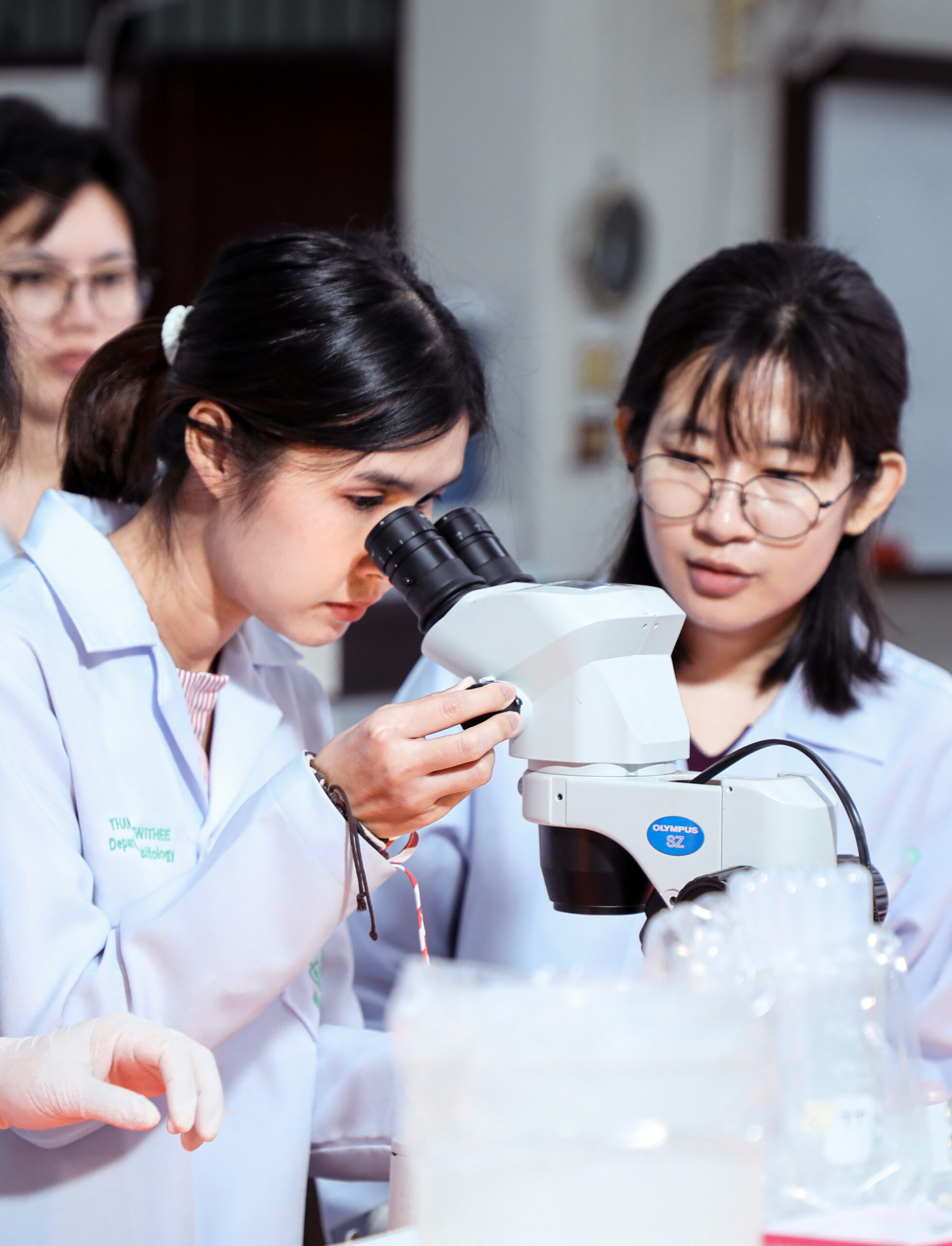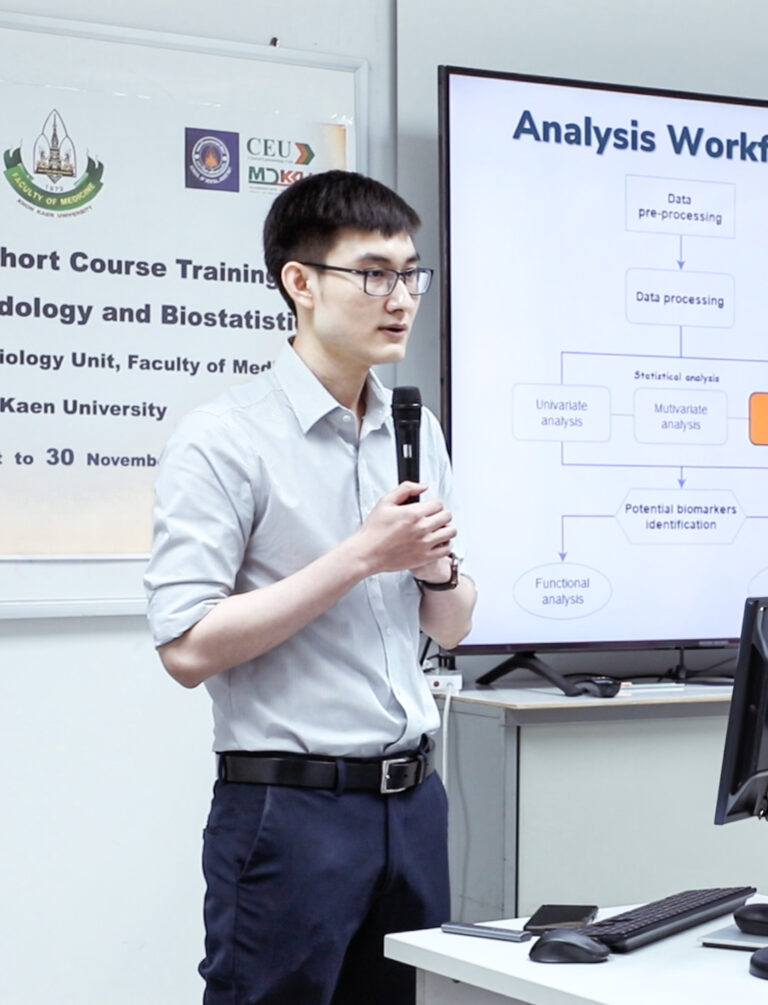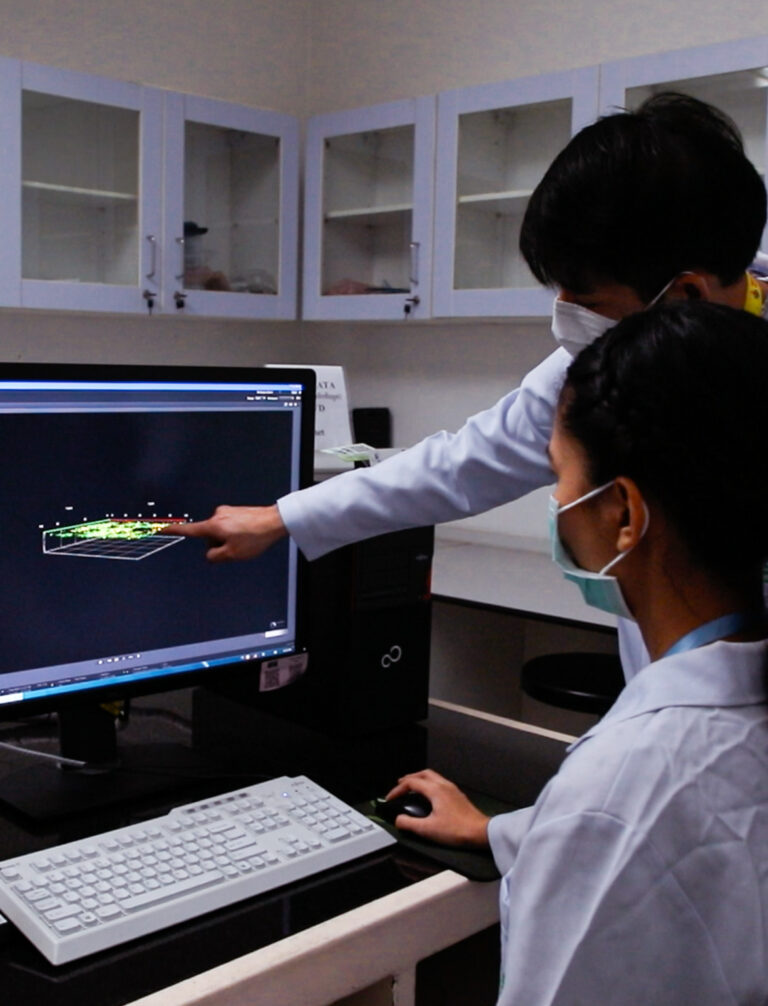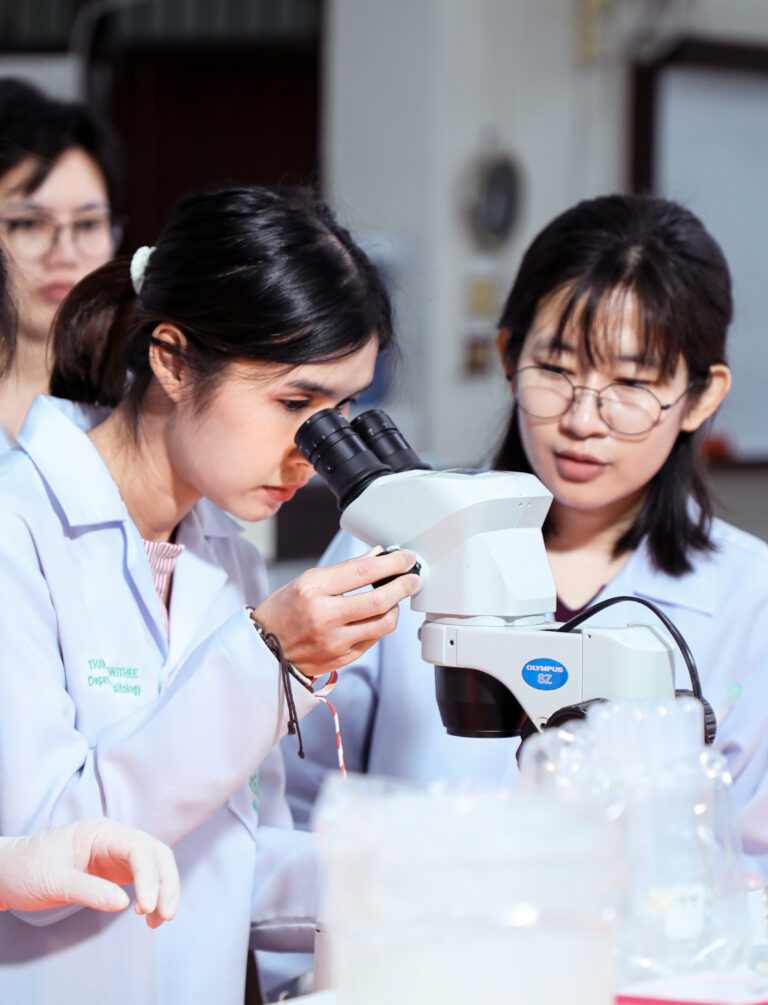- Course name:
1.1 Master of Science Program in Parasitology and One Health
(International Program)
1.2 Doctor of Philosophy Program in Parasitology and One Health
(International Program)
- Course Duration:
15 weeks/semester
- Study Options:
| M.Sc. | Ph.D. |
| Plan 1 Type A1 (2 years) | Plan 1.1 (3 years) |
| Plan 1 Type A2 (2 years) | Plan 2.1 (3 years) |
| Plan 2 (1 year and 6 month) | Plan 2.2 (4 years) |
- Coursework/Subject
(M.Sc. program) PLAN 1 TYPE A2
| Core Course: 11 Credits | ||
| Course ID | Subject | Credits |
| MD567 713 | Laboratory Techniques in Medical Sciences | 2(0-6-3) |
| MD567 714 | Medical Science Research Methodology | 3(2-3-6) |
| MD647 701 | Medical Parasitology and Entomology | 4(3-3-8) |
| MD647 703 | Experimental Parasitology | 3(1-6-5) |
| MD648 891 | Seminar in Parasitology I | 1(1-0-2) |
| MD648 892 | Seminar in Parasitology II | 1(1-0-2) |
| Thesis: 17 Credits | ||
| Course ID | Subject | Credits |
MD648 899 | Thesis | 17 Credits |
| Elective Courses: No fewer than 8 credits Students may select courses with the approval of their academic advisor from the following courses or from other graduate-level courses that the Department of Parasitology may offer later, or from other related graduate-level courses with the approval of the program’s executive committee and the departmental committee. | ||
| Course ID | Subject | Credits |
| MD567 712 | Cells and Molecular Biology | 3(3-0-6) |
| MD647 702 | Advanced Parasitology | 3(3-0-6) |
| MD647 704 | Molecular Technique in Parasitology | 2(0-6-3) |
| MD647 705 | Special Topics in Parasitology | 2(2-0-4) |
| MD647 706 | Immunology of Parasitic Infections | 2(2-0-4) |
| MD647 707 | Medical Malacology | 2(1-3-4) |
| MD647 708 | Medical Entomology | 2(1-3-4) |
| MD647 709 | Zoonosis | 2(0-6-3) |
| MD647 710 | Application of Geoinformatics in Health Science and Medical Research | 3(1-6-5) |
| MD647 711 | Parasite Epidemiology and Biostatistics | 2(1.5-1.5-4) |
| MD647 712 | Clinical Parasitology | 2(0-6-3) |
(M.Sc. program) PLAN 2
| Core Courses: 9 Credits | ||
| Course ID | Subject | Credits |
| MD647 713 | Parasitology for Public Health | 4(3-3-8) |
| MD647 714 | Special Project | 3(0-6-3) |
| MD648 893 | Seminar in Parasitology for Public Health I | 1(1-0-2) |
| MD648 894 | Seminar in Parasitology for Public Health II | 1(1-0-2) |
| Independence Study: 6 credits | ||
| Course ID | Subject | Credits |
| MD648 897 | Independence Study | 6 credits |
| Elective Courses: No fewer than 21 credits Students may select courses with the approval of their academic advisor from the following courses or from other graduate-level courses that the Department of Parasitology may offer later, or from other related graduate-level courses with the approval of the program’s executive committee and the departmental committee. | ||
| Course ID | Subject | Credits |
| MD647 702 | Advanced Parasitology | 3(3-0-6) |
| MD647 703 | Experimental Parasitology | 3(1-6-5) |
| MD647 704 | Molecular Technique in Parasitology | 2(0-6-3) |
| MD647 705 | Special Topics in Parasitology | 2(2-0-4) |
| MD647 706 | Immunology of Parasitic Infections | 2(2-0-4) |
| MD647 707 | Medical Malacology | 2(1-3-4) |
| MD647 708 | Medical Entomology | 2(1-3-4) |
| MD647 709 | Zoonosis | 2(0-6-3) |
| MD647 710 | Application of Geoinformatics in Health Science and Medical Research | 3(1-6-5) |
| MD647 711 | Parasite Epidemiology and Biostatistics | 2(1.5-1.5-4) |
| MD647 712 | Clinical Parasitology | 2(0-6-3) |
(Ph.D. program) plan 1.1
| Core Course: | ||
| Course ID | Subject | Credits |
MD649 991 | Seminar in Parasitology and Medical Sciences I | 1(1-0-2) (Not counted for credit) |
MD649 992 | Seminar in Parasitology and Medical Sciences II | 1(1-0-2) (Not counted for credit) |
MD649 993 | Seminar in Parasitology and Medical Sciences III | 1(1-0-2) (Not counted for credit) |
| Dissertation: 48 Credits | ||
MD649 996 | Dissertation | 48 Credits |
(Ph.D. program) plan 2.1
| Core Course: 10 credits | ||
| Course ID | Subject | Credits |
| MD647 701 | Medical Parasitology and Entomology | 4(3-3-8) |
| MD647 702 | Advanced Parasitology | 3(3-0-6) |
MD649 991 | Seminar in Parasitology and Medical Sciences I | 1(1-0-2) |
MD649 992 | Seminar in Parasitology and Medical Sciences II | 1(1-0-2) |
MD649 993 | Seminar in Parasitology and Medical Sciences III | 1(1-0-2) |
| Elective Courses: No fewer than 2 credits Students may select courses with the approval of their academic advisor from the following courses or from other graduate-level courses that the Department of Parasitology may offer later, or from other related graduate-level courses with the approval of the program’s executive committee and the departmental committee | ||
| Course ID | Subject | Credits |
| MD567 712 | Cells and Molecular Biology | 3(3-0-6) |
| MD567 713 | Laboratory Techniques in Medical Sciences | 2(0-6-3) |
| MD567 714 | Medical Science Research Methodology | 3(3-0-6) |
| MD647 703 | Experimental Parasitology | 3(1-6-5) |
| MD647 704 | Molecular Technique in Parasitology | 2(0-6-3) |
| MD647 705 | Special Topics in Parasitology | 2(2-0-4) |
| MD647 706 | Immunology of Parasitic Infections | 2(2-0-4) |
| MD647 707 | Medical Malacology | 2(1-3-4) |
| MD647 708 | Medical Entomology | 2(1-3-4) |
| MD647 709 | Zoonosis | 2(0-6-3) |
| MD647 710 | Application of Geoinformatics in Health Science and Medical Research | 3(1-6-5) |
| MD647 711 | Parasite Epidemiology and Biostatistics | 2(1.5-1.5-4) |
| MD647 712 | Clinical Parasitology | 2(0-6-3) |
| MD647 713 | Special Project | 3(0-6-3) |
| Dissertation: 36 credits | ||
| Course ID | Subject | Credits |
| MD649 998 | Dissertation | 36 credits |
(Ph.D. program) plan 2.2
| Core Courses: These are the main courses that students in the program must register for, totaling 18 credits, consisting of the following courses or other courses that may be offered later with the approval of the program’s executive committee. | ||
| Course ID | Subject | Credits |
| MD567 713 | Laboratory Techniques in Medical Sciences | 2(0-6-3) |
| MD567 714 | Medical Science Research Methodology | 3(3-0-6) |
| MD647 701 | Medical Parasitology and Entomology | 4(3-3-8) |
| MD647 702 | Advanced Parasitology | 3(3-0-6) |
| MD647 703 | Experimental Parasitology | 3(1-6-5) |
MD649 991 | Seminar in Parasitology and Medical Sciences I | 1(1-0-2) |
MD649 992 | Seminar in Parasitology and Medical Sciences II | 1(1-0-2) |
MD649 993 | Seminar in Parasitology and Medical Sciences III | 1(1-0-2) |
| Elective Courses: No fewer than 6 credits Students may select courses with the approval of their academic advisor from the following courses or from other graduate-level courses that the Department of Parasitology may offer later, or from other related graduate-level courses with the approval of the program’s executive committee and the departmental committee. | ||
| Course ID | Subject | Credits |
| MD567 712 | Cells and Molecular Biology | 3(3-0-6) |
| MD647 704 | Molecular Technique in Parasitology | 2(0-6-3) |
| MD647 705 | Special Topics in Parasitology | 2(2-0-4) |
| MD647 706 | Immunology of Parasitic Infections | 2(2-0-4) |
| MD647 707 | Medical Malacology | 2(1-3-4) |
| MD647 708 | Medical Entomology | 2(1-3-4) |
| MD647 709 | Zoonosis | 2(0-6-3) |
| MD647 710 | Application of Geoinformatics in Health Science and Medical Research | 3(1-6-5) |
| MD647 711 | Parasite Epidemiology and Biostatistics | 2(1.5-1.5-4) |
| MD647 712 | Clinical Parasitology | 2(0-6-3) |
| Dissertation: 48 credits | ||
| Course ID | Subject | Credits |
| MD649 999 | Dissertation | 48 credits |
- PLOs
| Program Learning Outcomes (PLOs) of Master of Science Program in Parasitology and One Health | |
| Plan 1 | Plan 2 |
| 1. Explain the knowledge of parasitology and entomology, including the relationships and impacts of parasites on humans, animals, and the environment, to foster a correct understanding of One Health and enable the integration of this knowledge with other disciplines. | 1. Explain the knowledge of parasitology and entomology, the impacts of parasites on humans, animals, and the environment, to understand One Health, and apply this understanding to integrate and address health problems in a holistic manner within the profession. |
| 2. Possess the skills to correctly perform various procedures related to parasites and entomology to assist in conducting research and diagnosing parasitic infections and insect-borne diseases. | 2. Possess the skills to perform procedures related to parasites and entomology, to be used in conducting independent studies and diagnosing parasitic infections and insect-borne diseases in humans, animals, and those contaminating the environment accurately. |
| 3. Integrate theoretical and practical knowledge in parasitology and entomology to effectively conduct research. | 3. Integrate theoretical and practical knowledge in parasitology and entomology to apply in conducting independent studies. |
| 4. Conduct research to apply existing knowledge and publish the results in national or international journals. | 4. Carry out independent study projects to develop the ability to solve problems or advance work in the professional field. |
| 5. Possess lifelong learning skills, such as using information technology like computers to gather, manage, and analyze data, in order to develop oneself for academic and research work. | 5. Possess lifelong learning skills, such as the ability to independently search for information and learn using computer and information technology, in order to develop oneself and advance in the professional field. |
| 6. Possess English communication skills in listening, speaking, reading, and writing to effectively present research work. | 6. Possess English communication skills in listening, speaking, reading, and writing. |
| 7. Possess analytical thinking skills in academic and research work to assist in conducting research and foster an entrepreneurial mindset. | 7. Possess analytical thinking skills in academic work to systematically develop work and solve problems, while promoting an entrepreneurial mindset. |
| 8. Possess morals, ethics, and academic professionalism in both professional work and research, as well as adhere to relevant laws and regulations, such as not plagiarizing others’ research. | 8. Possess morals, ethics, and academic professionalism in both academic work and research. |
| 9. Possess leadership skills, including responsibility, and the ability to work collaboratively with multidisciplinary teams in academic work, research, and various activities. | 9. Possess leadership skills, including responsibility, and the ability to work collaboratively with multidisciplinary teams in academic work, experimental studies, and various activities. |
| Program Learning Outcomes (PLOs) of Doctor of Philosophy Program in Parasitology and One Health |
| 1. Explain the complex knowledge of parasitology and entomology, including the relationships and impacts of parasites on humans, animals, and the environment, as well as the correct understanding of One Health. This knowledge should be integrated with other related disciplines, such as pathology, pharmacology, etc. |
| 2. Possess the skills to correctly perform complex procedures related to parasites and entomology in order to conduct research or diagnose parasitic and vector-borne diseases. |
| 3. Integrate theoretical and practical knowledge in parasitology and entomology to create research topics, plan research, conduct research, and solve problems systematically. |
| 4. Conduct research, including creating research questions, planning research, solving problems systematically, summarizing research, and generating new research to create new knowledge. This knowledge can lead to innovations or new innovations and be published in internationally recognized journals. |
| 5. Possess lifelong learning skills, such as the ability to independently search for information using computers and information technology to collect, manage, and analyze data. Use this knowledge for academic and research work. Continuously conduct research or participate in academic conferences to enhance knowledge and professional advancement. |
| 6. Possess English communication skills in listening, speaking, reading, and writing, to be able to present academic or research work at national or international conferences. |
| 7. Possess analytical and synthetic thinking skills in academic and research work, and have an entrepreneurial mindset. |
| 8. Possess morals, ethics, and academic professionalism in both professional work and research, as well as adhere to relevant laws and regulations. |
| 9. Possess leadership skills, including responsibility, and the ability to work collaboratively with multidisciplinary teams in academic work, research, and various activities. |
- Tuition fees
M.Sc. program (25,000 TBH/semester), Ph.D. program (30,000 TBH/semester) and additional fees 15,000 TBH/semester (only international student)
- Scholarship
Many different types of scholarship are available for outstanding
students including scholarships from
1) Faculty of Medicine, KKU
2) Liver Fluke and Cholangiocarcinoma Research Center, KKU
3) KKU scholarship for ASEAN and GMS countries
4) Graduate School, KKU
5) The Royal Golden Jubilee Ph.D. program.
Details of scholarships are available on the website of the Graduate School
of Khon Kaen University and the Graduate Section, Faculty of Medicine
- Staffs
| 1. | Prof. Thidarut Boonmars |
| 2. | Prof. Paiboon Sithithaworn |
| 3. | Prof. Wanchai Maleewong |
| 4. | Prof. Somchai Pinlaor |
| 5. | Assoc. Prof. Thewarach Laha |
| 6. | Assoc. Prof. Porntip Laummaunwai |
| 7. | Assoc. Prof. Apiporn Thinkhamrop |
| 8. | Assoc. Prof. Oranuch Sanpool |
| 9. | Assis. Prof. Chatanun Eamudomkarn |
| 10. | Assis. Prof. Nuttanan Hongsrichan |
| 11. | Assis. Prof. Opal Pitaksakulrat |
| 12. | Dr. Nattapon Ekobol |
| 13. | Dr. Apisit Chaidee |
9. Contact Details:
Assoc. Prof. Oranuch Sanpool
Tel. 0-4336-3268, 0-4336-3434
E-mail: oransa@kku.ac.th
Website: https://nattek.wixsite.com/parasitologykku
Facebook page: Department of Parasitology, KKU
YouTube: Parasitology KKU
TikTok: Parasitology KKU
Official Line: ParasitologyMDKKU




